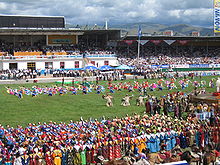- Mongolians in the United Kingdom
-
Mongolians in the United Kingdom Total population Mongolian-born residents
299 (2001 UK Census)
Other population estimates
7,000 (2009 IOM estimate)Regions with significant populations Greater London, Manchester Languages Religion Mongolians in the United Kingdom (also known as Mongols) are a relatively small but fast emerging ethnic group, including both Mongolian-born people in the UK alongside their British-born descendants.[1]
Contents
History and settlement
Migration from Mongolia to the United Kingdom is a fairly recent phenomenon that is directly connected to the political and social changes that have taken place in Mongolia in the late 20th/ early 21st century.[1] During the mid-1900s the only significant Mongolian diaspora existed in the former Soviet Union due to strong ties with each respective nation. However after 1991 when the Soviet Union collapsed and began to form a democratic nation, migration trends from Mongolia began to change and the movement of Mongolians to other parts of the world (including the UK) became much more evident.[1] Following these major changes to the political composition of Mongolia, many citizens of the nation found that they struggled in the new economy, many subsequently left the country in search of new lives in the United States and Western Europe. Migration to the UK specifically began in the 1990s and has continued ever since, the majority of Mongolians who came to the UK in the 1990s were economic migrants who intended to earn money to support themselves and their family back home, in contrast to this most migrants who came to the UK prior to the year 2000 were largely students seeking better standards of higher education.[1] Evidence of a more established community has come to light in the increasing number of Mongolian-run bars, cafés, shops and organisations in the UK.[1]
Demographics and population
 One of Mongolia's most important yearly events, the Naadam is also celebrated by British Mongolians in London, albeit on a much smaller scale
One of Mongolia's most important yearly events, the Naadam is also celebrated by British Mongolians in London, albeit on a much smaller scale
The 2001 UK Census showed that a meer 299 Mongolian-born people were residing in the UK, however this figure of a few hundred is thought to have increased to several thousand in the space of a decade.[1] To be precise, community leaders and the Mongolian Embassy have put the figure at between 5,000 and 7,000.[1][2] Within the UK, the overwhealming majority of Mongolians reside in Greater London with 2009 estimates placing at least 5,000 Mongolians in the British capital, the Mongolian community of Manchester follows which is 400 to 500 members strong (up from 72 Mongolian-born residents in 2001).[1] Newcastle upon Tyne is thought to be home to 100 Mongolians whilst between 60 and 70 reside in Leicester and no greater than 60 call Bradford home. An investigation by the International Organization for Migration also found evidence of a number of Mongolians also residing in Brighton, Liverpool, Milton Keynes, Nottingham and the university towns of Cambridge, Oxford, Dundee and Cardiff.[1]
Culture and community
There are currently no Mongolian-run publications (including television networks, radio stations or newspapers) in the UK, an IOM investigation showed that most Mongolians in the UK that wish to access news from their homeland do so via the internet.[1] To reflect the rapid increase of the size of the UK's Mongolian community, numerous community groups have been set up in hope of bringing Mongolians in the UK together as well as acting as a helpful aid in adjusting to the British lifestyle. An annual Mongolian 'Naadam' takes place every July in Islington's Highbury Fields (the same time a much larger similar festival takes place in the Mongolian capital, Ulaanbaatar).[3] also known as the Mongolia Charity Rally, the event is attended by Mongolians from across the country who come together and enjoy wrestling, archery, food and traditional music.[3]
See also
References
- ^ a b c d e f g h i j "Mongolia: Mapping exercise". London: International Organization for Migration. May 2009. http://www.iomlondon.org/doc/mapping/IOM_MONGOLIA.pdf. Retrieved 16 May 2010.
- ^ "Mongolia and the UK". Embassy of Mongolia in the United Kingdom. http://www.embassyofmongolia.co.uk/index.php?option=com_content&view=category&id=36&Itemid=37&lang=en. Retrieved 16 May 2010.
- ^ a b "London Mongolia Naadam 2010". Mongolia Chairty Rallies.com. http://mongolia.charityrallies.org/naadam. Retrieved 16 May 2010.[dead link]
Migration to the United Kingdom from Asia East Asia 
South Asia Southeast Asia Burmese · Filipino · Malaysian · Singaporean · Thai · VietnameseWest Asia Categories:- British people of Asian descent
- British people of Mongolian descent
- Immigration to the United Kingdom by country of origin
- Mongolian expatriates in the United Kingdom
Wikimedia Foundation. 2010.
